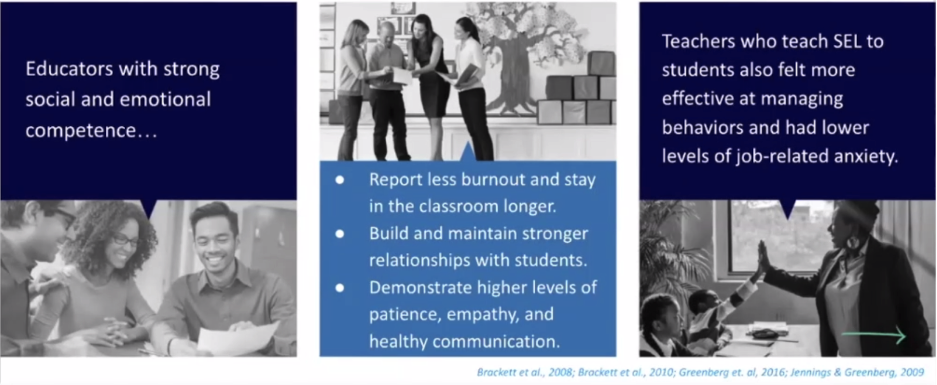Do administrators, educators, and support staff have meaningful opportunities to reflect on and develop their own social, emotional, and cultural competencies?

Engage in your own social and emotional learning (SEL) and support others to explore the purpose and impact of SEL and cultivate personal social, emotional, and cultural competence as they prepare to implement SEL, build relationships, and foster supportive learning environments.
Kimberly A. Schonert-Reichl in Social and Emotional Learning and Teachers
To fully implement schoolwide SEL, it’s important for school staff members to cultivate their own social and emotional competence while developing their ability to support SEL for students. For more than a decade, CASEL has learned alongside school districts how focusing on adult learning is an implementation priority: by experiencing SEL, adults become stronger and more effective practitioners, advocates, and models of SEL (CASEL, 2021).
The social and emotional competence of adults influences teacher-student relationships, classroom culture and management, effective instruction, and teacher well-being (Grissom, et al., 2021; Jones et al., 2013; Oliveira et al., 2021). Investing in a culture of SEL among adults contributes to job satisfaction and retention, and studies have shown that teacher well-being impacts student outcomes as well (Madigan & Kim, 2021; Jennings et al., 2017; Oberle & Schonert-Reichl, 2016; Braun et al., 2020). Educators with strong social and emotional competence:

Use the rubric or the questions below to build or refine your plan for supporting adults in their own SEL:
Do administrators, educators, and support staff have meaningful opportunities to reflect on and develop their own social, emotional, and cultural competencies?
Are these opportunities built into regular staff meetings and part of the school’s overall professional learning strategy?
Do these opportunities include structured activities to support staff in examining their mindsets and biases?
Do schoolwide structures and systems prioritize staff well-being?
Does the SEL team regularly review data related to professional learning and staff experiences to plan ongoing support?
Depending on the responses to the questions, you may want to prioritize certain areas in your plan for supporting adult SEL in your school setting. In this section, you’ll find the activities to support staff in developing SEL knowledge, dispositions, and skills through: